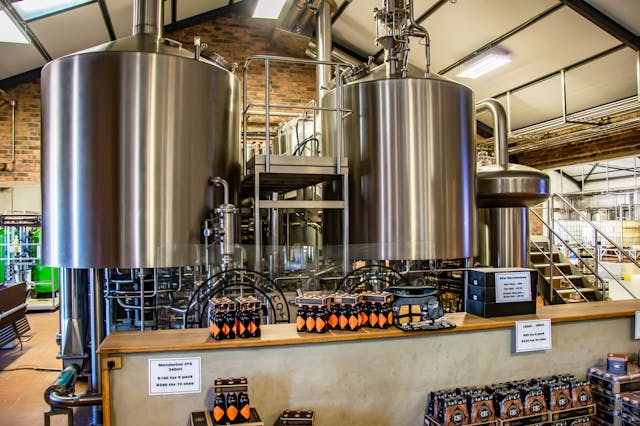Edward Teach Brewing ABC permits canceled in June 2025 amid unpaid fees and ownership issues, shaking the Wilmington craft-beer scene.
In June 2025, Edward Teach Brewing had its two alcohol permits; for malt beverage and unfortified wine on premises; canceled by the North Carolina Alcoholic Beverage Control Commission. This meant the taproom couldn’t legally pour those drinks anymore.
I’ll be honest… when I first heard that Edward Teach Brewing lost its permits, my first thought was, “Wait, what?” You picture the taproom; the hum of conversation, fresh hops in the air, people laughing over pints; and then suddenly, the doors are closed. The permits are gone.
And as I dug in, it got messy. The story wasn’t just about a couple of licenses being revoked. It was ownership changes, unpaid fees, legal complications, storm damage, renovations… a whole web of things colliding at once. You’re about to walk through it with me; figuring it out as we go.
Article Breakdown
What the Permit Cancellation Actually Means
Here’s the core of it. Edward Teach Brewing had two permits: one for selling malt beverages on-site, another for unfortified wine. When those were canceled in June 2025, it wasn’t a small hiccup. The taproom couldn’t legally pour anything covered under those licenses. If you’ve ever tried to run a bar without a license, you know… it’s like trying to drive without a car.
Why did this happen? Two main reasons. First, the brewery didn’t pay its annual renewal fees. That alone could trigger a cancellation. But then there was the legal complication; the owner had a conviction that made him ineligible to hold permits. So even if the money had been paid, the eligibility issue was enough to cause a problem.
Who Held the Permits and What’s Going On with Ownership
The permits were first issued in 2018. Over the years, the brewery had become a familiar spot in Wilmington. But things started to shift. The previous owner ran into legal trouble, and in July 2025, a new owner stepped in; his sister took over as the controlling trustee.
And here’s the thing… the taproom had already been closed for months for renovations because of storm damage. So when you try to make sense of the cancellation, you’re juggling multiple threads: unpaid fees, legal eligibility, renovations, and new ownership. Each one is significant. Together, they’re a tangle.
How This Affects You and the Local Community
Now, put yourself in the community’s shoes. You walk by the taproom. Empty chairs. A quiet bar. Maybe a “closed” sign. The permit cancellation adds a layer of weight. This isn’t just a renovation pause… legally, they can’t pour alcohol.
For Wilmington craft-beer fans, it’s a reminder: even your favorite spots are subject to rules you might not see. And if the new owner does things right, this could become a fresh start. But until then, uncertainty hangs in the air.
Risks and Opportunities
Let’s break it down. There are clear risks:
- Credibility. You might hesitate to go back if the situation is unclear.
- Financial. No permits mean no alcohol sales, and those are the heart of a taproom’s income.
- Ownership transition. New leadership could mean new ideas, or it could mean friction.
- Regulatory lessons. Missing fees or having an ineligible owner can shut you down fast.
But there’s another way to see it. Maybe this pause is a chance. Maybe it’s the moment to rebuild better. The renovations are underway. The new trustee could relaunch with a fresh identity. And the community might respond positively; if they’re brought along for the story.
Timeline of Events
Sometimes, putting it in order makes things clearer:
- 2018: Permits issued for malt beverage and unfortified wine.
- Late 2024/Early 2025: Taproom closed for storm damage renovations.
- May 2025: Owner had a conviction, creating an eligibility problem.
- June 2, 2025: ABC Commission canceled both permits for unpaid fees and ineligibility.
- July 2025: New owner announced. Sister takes over as trustee.
- August 2025: News coverage makes cancellation widely known.
Or, when you lay it out like this, it’s easy to see how multiple threads; financial, legal, operational; all converged at once.
Understanding ABC Permits in North Carolina
If you’ve ever thought about running a brewery, here’s what matters:
- Pay your fees. Miss them, and you risk automatic cancellation.
- Make sure everyone holding a permit is eligible. Legal trouble can cost you.
- Stick to what your permit allows. Deviate, and regulators notice.
- Communicate changes clearly, especially if ownership or operations shift.
And here’s the tension… you want to focus on brewing, tasting, community events, but the legal obligations won’t pause just because you’re busy.
How Edward Teach Brewing Compares to Other Breweries
Here’s a simple snapshot:
| Feature | Edward Teach Brewing | Typical Compliant Brewery |
|---|---|---|
| Permit Status | Cancelled | Active and compliant |
| Reason | Unpaid fees + owner ineligible | Fees paid, owner eligible |
| Taproom | Closed for renovations | Open or temporarily closed but compliant |
| Ownership | Changed in July 2025 | Usually stable |
| Community Impact | Uncertainty, trust risk | Confidence, reliability |
Also, when you look at it this way, you see just how quickly things can go sideways if you miss one critical element.
Lessons and Reflections
What I realized writing this… running a brewery isn’t just about great beer. It’s rhythm. The rhythm of permits, fees, eligibility, community trust. You can have the best beer in the city, but if the legal foundation falters, the whole thing stops.
Yet, there’s also hope here. This pause could be a reset. New ownership, renovations, fresh strategy; all of it could lead to a stronger comeback. But only if the next steps are handled carefully.
Potential Next Steps
So what’s next for Edward Teach Brewing?
- Reapply for permits. Pay fees, clear eligibility issues, and get back on track.
- Rebrand and relaunch. Use the downtime to tell a new story.
- Sale or exit. If the hurdles are too big, maybe the location changes hands.
- Partial operation without alcohol. Events, food, or non-alcoholic offerings could keep the space alive while sorting permits.
Also, success depends on clear communication, fixing the regulatory issues, regaining trust, and making sure the space is ready when the doors reopen.
Frequently Asked Questions
Who canceled Edward Teach Brewing’s permits? The North Carolina ABC Commission canceled the malt beverage and unfortified wine on-premises permits in June 2025.
Why were the permits canceled? Unpaid renewal fees and the previous owner’s legal issues triggered the cancellation.
Is Edward Teach Brewing permanently closed? Not necessarily. The taproom has been closed for renovations, and ownership has changed. Permits will need to be reinstated to reopen fully.
What does “Unfortified Wine on Premises” mean? It’s a permit category allowing wine without added spirits to be sold for on-site consumption, like a wine bar license.
Can the brewery apply for new permits? Yes. If fees are paid and eligibility is confirmed, the brewery can reapply or have permits reinstated.
Key Takings
- The permit cancellation reflects regulatory and operational disruption.
- Unpaid fees and ineligible permittees are serious triggers for permit loss.
- Ownership changes complicate things but can also provide a fresh start.
- Renovations and closures might hide deeper compliance issues.
- Craft breweries must balance creativity with legal obligations.
- Reinstating permits is possible if the right steps are taken.
- The Wilmington craft-beer community will watch closely how the brewery recovers.



